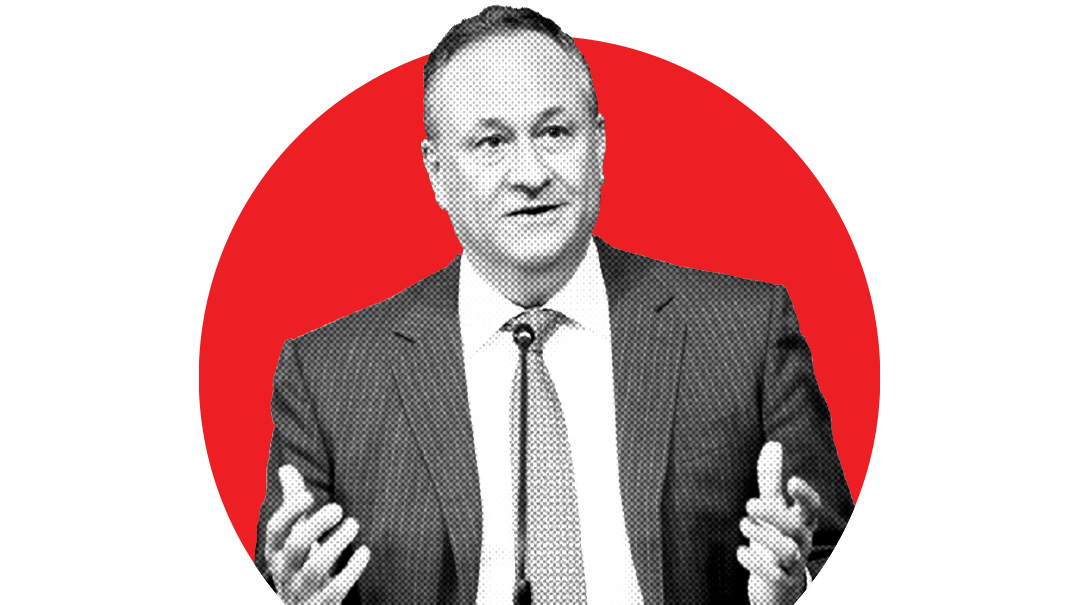Can Policymakers Combat Antisemitism?

The administration is in something of a tough spot, as the rise in anti-Semitism can largely be traced to social media

Photo: AP Images
The spike in anti-Semitism in the US over the past few months is nothing short of alarming. And it’s manifesting everywhere. On social media, in schools and universities, on subways, and even in the streets. Nowhere are Jews immune from attack, while anti-Semites seem increasingly emboldened.
After a series of very high-profile anti-Semitic incidents, Second Gentleman Doug Emhoff decided to convene a roundtable meeting at the White House with senior administration officials such as domestic policy council director Susan Rice and anti-Semitism envoy Deborah Lipstadt, and representatives of some 20 Jewish organizations, from the Presidents’ Conference to the AJC, the anti-Defamation League, and religious groups such as the OU, Agudas Yisrael, and Chabad.
I was present for the first part of the roundtable meeting, which was open to the press, in which Emhoff spoke of his Jewish pride and refusal to be intimidated. Emhoff said that an epidemic of hate is spreading across the US and that the administration is ready to combat it.
The tone was blunt and direct, but the real meeting only began after the cameras were turned off and we in the press were asked to leave the room, with each group’s representative being asked to share his views.
The administration is in something of a tough spot, as the rise in anti-Semitism can largely be traced to social media. And even when users are posting under their real names, anti-Semitic incitement often comes in the form of dog-whistling — i.e., statements clearly referencing Jews, but sufficiently vague to fall under the First Amendment right of free speech.
There’s no magic solution for the problem, but according to the representatives at the meeting, there’s still plenty to be done.
“The government has many tools at its disposal to amplify statements reflecting it positions on any matter,” said Rabbi Levi Shemtov, executive vice president of the American Friends of Lubavitch (Chabad), to Mishpacha. “This is no exception.”
“Both parties have addressed this issue, starting when President George W. Bush supported the appointment of a special envoy to combat anti-Semitism 15 years ago,” he noted. “The issue has since gotten much worse, and anti-Semites have begun feeling less inhibited and even a little comfortable, Rachmana litzlan.”
I asked him if there was substance to the roundtable discussion, or if it was essentially a photo op. “The event was, in my opinion, more than a photo op,” he said. “The administration has now shot across the bow of anti-Semites.
“After the press left, every participant got to freely share thoughts on the matter,” he explained. “The senior officials present, including (and maybe especially) Mr. Emhoff, took copious notes, and they seemed eager to move to action items. The next phase is key, and hopefully we will see some good developments. The commitment was made to take effective steps in a coordinated way. It seemed serious to me.”
Nathan Diament is the executive director for the Orthodox Union Advocacy Center. “There are many actions the federal government can take to combat anti-Semitism,” he said. “The Biden administration and other national leaders have taken important steps already. Just this week the House and Senate came to an agreement to include in the National Defense Authorization Act (NDAA) an authorization to fund DHS’s Nonprofit Security Grant Program at $360 million — the funding level we have been advocating for.
“But we have other initiatives we have raised with the White House and Congressional leaders. These include but are not limited to allocating a portion of the grants made by the Department of Justice to local police departments specifically for the purpose of increasing their patrols at shuls and their presence in Jewish communities; the adoption of the IHRA working definition of anti-Semitism as an administration-wide policy; and the Department of Education more aggressively investigating and penalizing incidents of campus anti-Semitism.”
Wednesday’s event was an important event, and not just a photo op, Diament said.
“Wednesday’s event was a very important and impactful event. The unequivocal support from the senior leaders in the White House in fighting back against the hate we are witnessing is historically significant and should not be overlooked.
“I was struck by the fact that this meeting took place in the very same building (the EEOB) which decades ago housed the offices of government officials (such as Breckenridge Long) who actively blocked the Roosevelt administration from assisting Jews being persecuted in Europe. Yesterday, in that room, the Second Gentleman declared himself a ‘proud Jew’ and the most senior White House officials stated their commitments to act in support of the community.”
(Originally featured in Mishpacha, Issue 940)
Oops! We could not locate your form.







